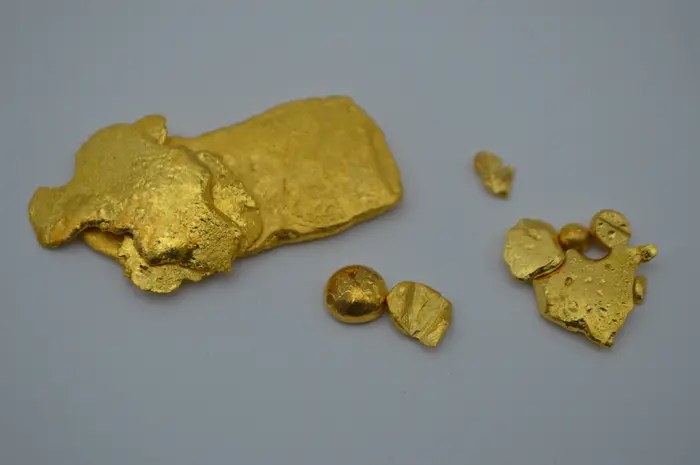
An interdisciplinary team at Flinders University in Australia has unveiled a groundbreaking method for extracting gold from ore and electronic waste that addresses environmental and health concerns associated with traditional mining practices. This innovative approach could redefine the gold recovery landscape by minimizing the environmental footprint often associated with conventional extraction routes that rely heavily on toxic chemicals like cyanide and mercury.
The details of this pioneering technique were published in the esteemed journal Nature Sustainability. The research indicates that it not only significantly curtails toxic waste production but also affirms the potential for recovering high-purity gold from discarded electronic components, particularly those found in printed circuit boards of outdated computers. The lead of this initiative, Professor Justin Chalker of Flinders University’s College of Science and Engineering, emphasizes that the goal of the study was to develop methods that not only enhance gold recovery rates but also prioritize environmental safety and sustainability.
The significant advancement comes from the integration of green chemistry and engineering principles, resulting in a safe and sustainable leaching reagent derived from trichloroisocyanuric acid—a compound commonly utilized in water disinfection. This new reagent can dissolve gold when activated with salt water, presenting an effective extraction method devoid of toxic byproducts that are often generated in traditional gold mining operations. This technique signals a shift towards using benign materials in chemical processes, paving the way for greener extraction methodologies.
.adsslot_d8eRmJ2xEA{ width:728px !important; height:90px !important; }
@media (max-width:1199px) { .adsslot_d8eRmJ2xEA{ width:468px !important; height:60px !important; } }
@media (max-width:767px) { .adsslot_d8eRmJ2xEA{ width:320px !important; height:50px !important; } }
ADVERTISEMENT
Following the gold dissolution process, the researchers designed a novel polymer sorbent that plays a crucial role in selectively binding the gold. This polymer, enriched with sulfur, demonstrated exceptional selectivity in complex mixture environments, allowing for the recovery of gold even in scenarios flooded with various other metals. What sets this method apart is its recyclability; once the gold is extracted, the polymer can be reverted back to its original monomer state, making the process more circular and reducing material waste.
The comprehensive nature of the study examined not only electronic waste but extended to mixed-metal waste and ore concentrates, highlighting the versatility of the technique developed by the research team. The potential applications of this method extend beyond electronics, aiming to create a more sustainable framework for gold extraction across various industries. This innovation may serve as a template for addressing the larger issue of e-waste management, which has reached alarming levels globally.
As the world continues to grapple with growing electronic waste, estimated at 62 million tonnes produced in 2022 alone, the need for efficient recycling processes is more pressing than ever. Alarmingly, only a small fraction of this e-waste is formally collected and recycled, indicating a vast area for improvement. The research from Flinders University not only provides a feasible solution but also encourages a rethinking of how society values and recycles its electronic materials.
A critical objective of the research was to diminish the reliance on hazardous chemicals that currently permeate most gold extraction methods. The use of cyanide and mercury has long been notorious for posing environmental and health risks, as runoff from mines can lead to contamination of local water sources and ecosystems. The Flinders team aims to lessen these impacts while ensuring that the process remains economically viable, thus addressing both environmental sustainability and community health concerns.
The study was the product of extensive collaboration among researchers across diverse fields, highlighting how interdisciplinary efforts can generate innovative solutions to complex global issues. The inclusion of experts from international locales, such as the US and Peru, underscores the collective desire to validate and potentially implement these findings in real-world scenarios that affect small-scale mining operations.
Lead authors Dr. Max Mann, Dr. Thomas Nicholls, Dr. Harshal Patel, and Dr. Lynn Lisboa performed rigorous testing on the extraction method and found success with significant amounts of gold recovered from substantial piles of e-waste. This achievement not only signifies a technical breakthrough but also advocates for the circular economy by encouraging the recovery of valuable materials from what is often viewed as waste.
As demand for gold remains high due to its indispensable role in electronics, medicine, and other industries, it is paramount to develop methods that do not exacerbate existing environmental crises. The methods proposed in this study are aligned with modern expectations for responsible resource management while enhancing the capabilities of sustainable practices. By demonstrating the potential of using existing waste materials for the recovery of precious metals, this research could inspire future innovations.
Professor Chalker, reflective on the collaborative nature of the work, applauded the roles played by industry stakeholders and philanthropic partners in creating pathways for translating lab-based discoveries into wider applications. This connection to industry highlights the crucial junction between scientific research and practical implementation, ensuring the sustainability of these new methodologies.
The paper presented substantial evidence from various trials and analyses regarding the efficacy of the new extraction techniques. It also serves as a benchmark, illustrating the necessity of ongoing interdisciplinary dialogue and research partnerships to combat the pressing challenges posed by e-waste and unsustainable mining practices. The comprehensive design of this study highlights the promising prospect of transforming the way valuable resources are extracted from complex material streams in a manner that is both eco-friendly and economically feasible.
With newly developed gold recovery solutions in industrial processes and academic inquiry, this research stands to stimulate conversation about how to responsibly utilize scarce resources in a world increasingly defined by technological advancement. The Flinders University team’s work underscores the potential of innovative scientific approaches to significantly mitigate environmental harm while paving new avenues for sustainable economic growth through improved waste management practices.
By tackling the issues related to gold extraction head-on, the team signals an encouraging shift toward environmental stewardship in the mining sector. The newfound methods not only promise to supply gold without harming human health or degrading the environment but also advocate for practices that will be essential as the world strives for a more sustainable future.
Subject of Research: Sustainable gold extraction from ore and electronic waste.
Article Title: Sustainable gold extraction from ore and electronic waste.
News Publication Date: 26-Jun-2025.
Web References: Link to Nature Sustainability.
References: Not applicable.
Image Credits: Credit: Flinders University.
Keywords
Gold extraction, electronic waste, sustainable methods, green chemistry, environmental impact, recycling, interdisciplinary research, Flinders University, polymer sorbent, toxic waste reduction, resource recovery, circular economy.
Tags: E-waste mining techniqueselectronic waste recycling solutionsenvironmental impact of miningFlinders University environmental initiativesgreen chemistry applicationshealth benefits of e-waste recyclinghigh-purity gold recoveryinnovative gold recovery processesinterdisciplinary research in miningreducing toxic waste in miningsustainable gold extraction methodssustainable mining practices



